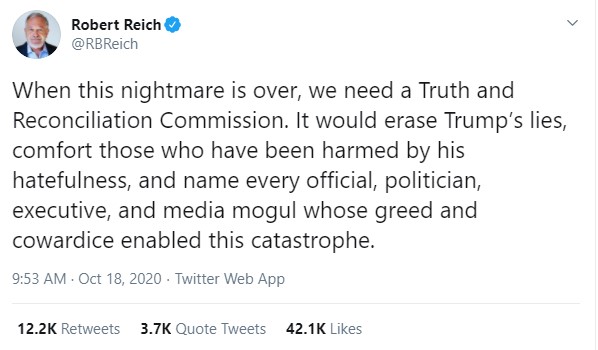Arthur Chrenkoff responds to this tweet from Robert Reich:
In case you are unfamiliar with the term, the Truth and Reconciliation Commission was instituted in the post-apartheid South Africa as a way of non-violently and non-punitively coming to terms with the painful racist past. It was a forum where the victims of human right abuses were able to testify about their experiences, and where some of the perpetrators could respond on record – ideally with some contrition – and request amnesty for their misdeeds. It was an exercise in “not forgotten, but possibly forgiven”, a way forward in transition to democracy that would not have to involve mass incarceration of those connected with the old regime. While criticised by many, this model of community healing is thought to have been quite successful in as much as it has been replicated in numerous other countries around the world as a way of dealing with the past and moving on. As the Good Book says, “the truth shall set you free”.
So – a Truth and Reconciliation Commission in America? You don’t have to have actually lived in a totalitarian society (even if, like with yours truly, it helps) to be taken aback at the insensitivity and the sheer tone deafness exhibited by a privileged member of the American elite (Clinton’s Labor Secretary, Berkley professor, 1 million Twitter followers) comparing the last four years in the United States to the four decades of South African apartheid or a quarter of a century of a military dictatorship in some coup-prone South American republic. Are these people really so lacking in self-awareness?
The answer is yes, and in turn it points to a more interesting socio-political phenomenon. For the past few decades, intellectuals (the great majority at various distances to the left of centre) have been looking at activists and dissidents outside of the developed, democratic “First World” – people like Nelson Mandela and Archbishop Desmond Tutu in South Africa, Ang Sang Suu Kyi in Burma/Myanmar, academics and trade unionists throughout Latin America fighting against right-wing dictatorships, and to a lesser extent those in opposition to communist dictatorships like the Dalai Lama, Lech Walesa in Poland, Vaclav Havel in Czechoslovakia, and Sakharov, Sharansky, Solzhenitsyn and others in the Soviet Union – and I think their main, if secret, reaction was envy and guilt.
Guilt because their own lives in the West were by and large safe, secure, privileged and prosperous, while their counterparts (intellectuals, artists, community leaders) in the Second and the Third World (now developing world) were putting their lives, freedom and livelihoods on the line for the principles and ideals they believed in. And envy because, as the stakes were so much higher “over there”, the lives of all these dissidents, oppositionists and human rights activists seemed so much more meaningful – and, yes, exciting. While you were pondering on the next New York Times op-ed you are going to write, while turning up to your monthly faculty meeting in your new Prius, somewhere in Africa or Asia or Latin America a prisoner of conscience was on a hunger strike, actually living the ideas you believed in and not just writing about them. Sure, it’s terrible, yet how much more interesting and consequential than your placid and predictable existence of mortgage repayments and the Monday morning undergraduate class in political theory?




